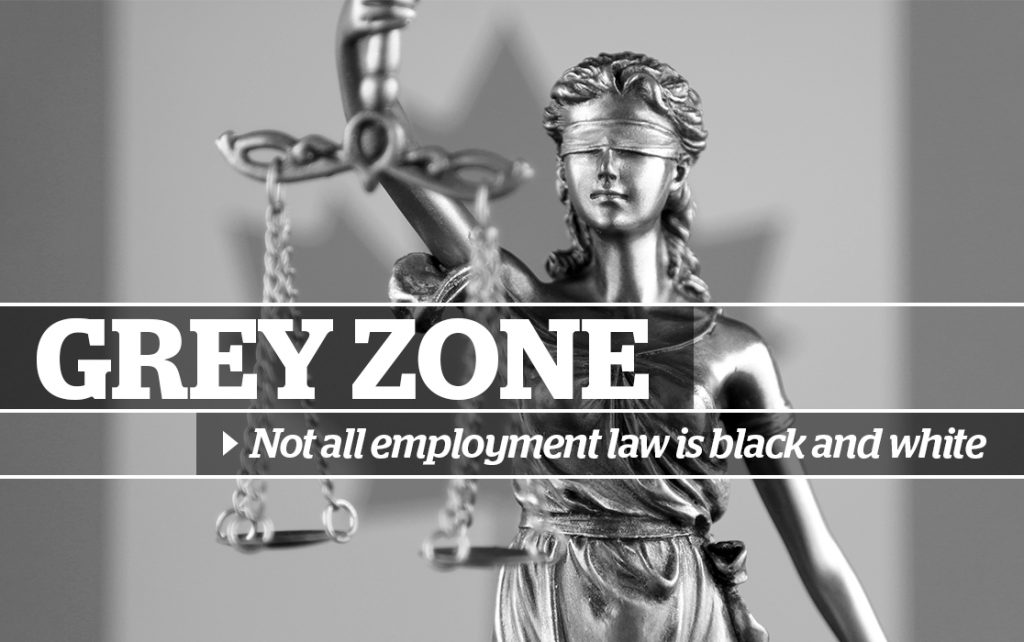
Is it a work refusal or job-protected leave?
December 3, 2020
By
John Hyde
Employees have rights to refuse work they reasonably deem unsafe

EDITOR’S NOTE: ‘Grey Zone: Not all employment law is black and white’ is a new weekly series for Talent Canada — a sister publication of OHS Canada. In partnership with John Hyde of Hyde HR Law in Toronto, this series will take a deeper look at issues in which senior workplace leaders and HR professionals need to consider legal implications.
“I don’t want to come into work.”
More and more, employers are facing new challenges as the COVID-19 pandemic continues to tear at the fabric of commerce.
The picture is particularly bleak for employers forced to close their business on account of mandatory emergency orders. However, relieved of that burden, employers permitted or required to remain open face a different problem — how to keep employees safe at work.
How should employers react to employees that simply do not want to come in to work? Should they be fired or laid off? Should they be given an unpaid leave of absence? Should they be allowed to work from home?
The problem is, the right choice is not always clear and making the wrong one is catastrophic.
COVID-19 job protections
As it relates to COVID-19, the Employment Standards Act of Ontario (ESA) provides job protection for employees not performing work duties because they are:
- under medical investigation, supervision or treatment for COVID-19
- acting pursuant to an order under the Health Protection and Promotion Act
- in isolation or quarantine or acting pursuant to public health information or direction
- directed by the employer not to work because the employee could spread COVID-19 in the workplace
- providing care or support to a specified individual for a reason related to COVID-19 such as a school or childcare closure or where an employee does not send their child to school or to childcare because of a concern that the child will come into contact with COVID-19
- prevented from returning to Ontario because of travel restrictions.
Employees who take advantage of the Infectious Disease Emergency Leave (IDEL) pursuant to the ESA, are not required to show a medical note as proof of entitlement and have the right to be away from work only for as long as the event that triggered the entitlement remains.
IDEL is designed to keep workplaces safe and, protect jobs. The leave is limited to the above criteria.
However, many employees do not know they are entitled to this leave. Surprisingly, many employers also are not aware.
Commonly, employees refuse to come in to work because they wrongly believe they are entitled to this leave or, employees return to work while under a public health quarantine order, because they fear the loss of their jobs.
Health and safety obligations
Most people reasonably fear being infected at work. In Ontario, employers have an obligation under the Occupational Health and Safety Act to maintain a safe workplace.
Employees also have a lawful right to refuse work that they reasonably deem unsafe.
What happens if the employer has done everything it reasonably can to implement protections — including providing necessary PPE — but the employee continues to refuse to come in to work?
Does the employer apply discipline for refusing a lawful direction — maybe a layoff or termination? Does the employer allow the employee to work from home if the job duties permit, recognizing this may open the floodgates for other employees to request the same accommodation?
Does the employer inform the employee about the protections available through IDEL (provided the requirements are met), recognizing of course the company still requires someone to do the work in the meantime?
What about other job protected leaves, such as sick leave, family responsibility leave, family caregiver leave, family medical leave and critical illness leave, which provide anywhere from three days to 37 weeks of job-protected leave?
There is no off-the-shelf solution and, employer response is subject to legal scrutiny.
Evolving legislation
Many will recall the summer news footage surrounding the death of a seasonal farm worker from COVID-19.
This month, the Ontario Labour Relations Board awarded damages to a co-worker, ruling that the employer’s decision to fire him on account of his refusal to come in to work, due to a belief that the workplace was unsafe, was an “unlawful reprisal.”
The employee received damages for lost wages, damages for loss of future earnings, damages awarded on the basis of a reasonable expectation of continued employment and damages for pain and suffering.
Currently winding its way through the Human Rights Tribunal of Ontario is another case, where an employee of a town police force has alleged discrimination on the basis of family status, when his request to work from home was refused.
The request was made to avoid exposure to COVID-19, because the applicant’s son had a “rare and serious chronic disease that could result in serious medical complications” if exposed to the infection. The outcome will be interesting.
There is no “one size fits all” in addressing work refusals and job-protected leaves.
The law is continuing to evolve and every employer response must be fact-specific and carefully planned — otherwise legal ramifications will follow.
John Hyde advises management on all aspects of employment and labour law, including representation before administrative tribunals, collective agreement negotiation, arbitrations, wrongful dismissal defence and human rights.